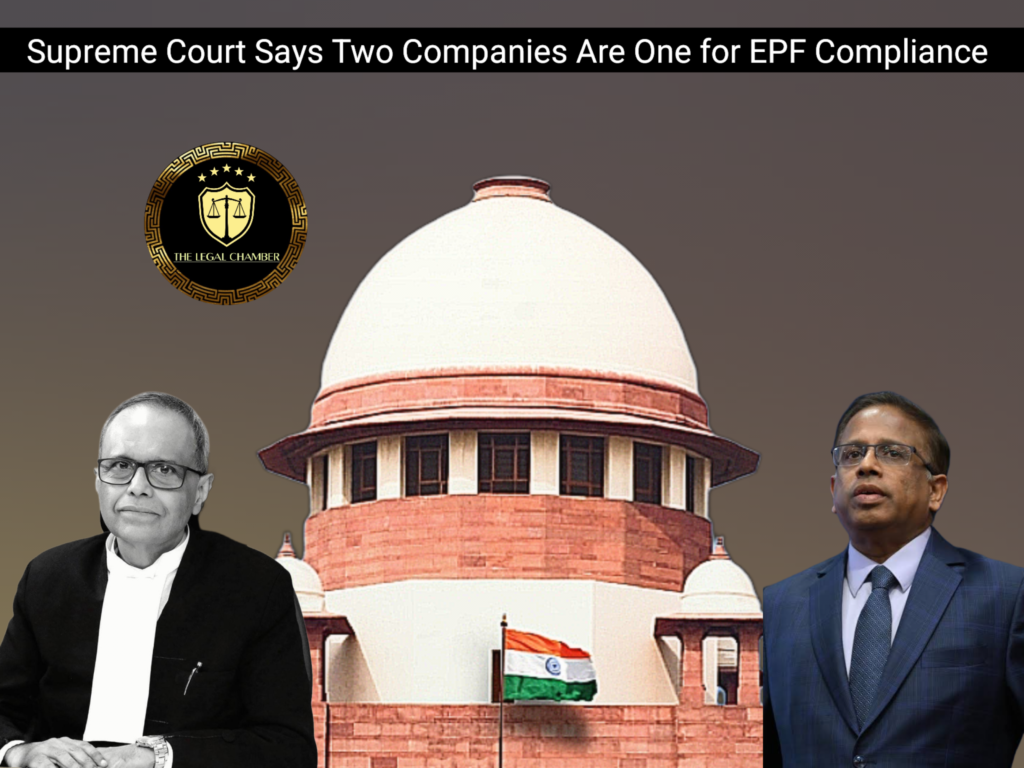
The Supreme Court upheld the clubbing of two pharmaceutical companies under the Employees’ Provident Funds and Miscellaneous Provisions Act, 1952, emphasizing the principles of unity of ownership, management, functional integrality, and financial unity. The Court rejected the argument that separate juristic entities preclude clubbing, affirming that the EPF Act, as a beneficial legislation, must be interpreted to prevent evasion. The decision reiterated that multiple factors, including common premises, shared infrastructure, and unified management, cumulatively determine whether entities constitute a single establishment. The judgment reinforced the authorities’ discretion to assess dues retrospectively once clubbing is established.
Facts Of The Case:
The case involved M/s Torino Laboratories Pvt. Ltd. (appellant) and the Union of India & others (respondents). The dispute arose from the Employees’ Provident Fund (EPF) authorities clubbing Torino Laboratories with M/s Vindas Chemical Industries Pvt. Ltd. (Vindas) for EPF Act compliance, treating them as a single establishment. Torino Laboratories was incorporated in 1990, while Vindas was set up in 1988, both engaged in pharmaceutical manufacturing and operating from adjacent plots in Pithampur, Madhya Pradesh. Inspections revealed shared infrastructure, including common administrative offices, telephone numbers, security personnel, and website, along with overlapping directors from the same family. The EPF authorities initially sought contributions from Torino based on employee strength but later concluded that the two firms were functionally integrated. The Assistant Provident Fund Commissioner (APFC) ordered clubbing from September 1995, a decision upheld by the Appellate Tribunal and the High Court. Torino challenged this, arguing separate legal identities, distinct registrations under various laws, and lack of functional interdependence. The Supreme Court examined the unity of ownership, management, and financial control, ultimately dismissing Torino’s appeal and affirming the clubbing, emphasizing the EPF Act’s welfare objectives and the need to prevent evasion through artificial separations.
Procedural History:
The case originated with an order dated 17.02.2006 by the Assistant Provident Fund Commissioner (APFC), Indore, which held that M/s Torino Laboratories Pvt. Ltd. and M/s Vindas Chemical Industries Pvt. Ltd. constituted a single establishment under the Employees’ Provident Funds and Miscellaneous Provisions Act, 1952 (EPF Act) and directed compliance from September 1995. Torino Laboratories challenged this order before the Employees’ Provident Fund Appellate Tribunal (EPFAT), New Delhi, which dismissed the appeal on 24.01.2011. Subsequently, Torino filed a writ petition under Article 227 of the Constitution before the High Court of Madhya Pradesh (Indore Bench), which upheld the Tribunal’s decision on 22.04.2016. Dissatisfied, Torino approached the Supreme Court of India via a special leave petition (Civil Appeal No. 9540 of 2018). The Supreme Court, after examining the factual and legal aspects, dismissed the appeal on 15.07.2025, affirming the clubbing of the two entities under the EPF Act and upholding the retrospective liability from 1995. The Court emphasized the unity of ownership, management, and functional integrality between the two firms while rejecting arguments based on separate legal registrations.
READ ALSO :Landmark Ruling: Supreme Court Dissolves Marriage Under Article 142 for Unhappy Couple
Court Observation:
The Supreme Court made several key observations while dismissing the appeal and upholding the clubbing of Torino Laboratories and Vindas Chemical Industries under the EPF Act, 1952. The Court emphasized that separate legal registration under the Companies Act or other statutes does not automatically preclude clubbing if other factors demonstrate functional unity. It noted that the two entities shared common management, ownership, infrastructure (premises, telephone numbers, security, and website), and financial control, all of which indicated functional integrality. The Court rejected Torino’s argument that absence of employee interchange was decisive, clarifying that multiple factors must be assessed cumulatively rather than in isolation. It also dismissed the contention that notice should have been issued to Vindas, ruling that since EPF liability was entity-specific, no separate notice was required. Additionally, the Court upheld the retrospective application of dues from 1995, noting that the EPF authorities had sufficiently indicated the possibility of clubbing in earlier communications. The judgment reinforced that beneficial labour legislations must be interpreted purposively to prevent evasion through artificial corporate structures. Ultimately, the Court affirmed that unity of purpose, management, and financial interdependence justified treating the two firms as a single establishment under the EPF Act.
Final Decision & Judgement:
The Supreme Court dismissed the appeal filed by M/s Torino Laboratories Pvt. Ltd., upholding the orders of the Assistant Provident Fund Commissioner (APFC), Employees’ Provident Fund Appellate Tribunal (EPFAT), and the Madhya Pradesh High Court. The Court ruled that Torino Laboratories and Vindas Chemical Industries constituted a single establishment under the Employees’ Provident Funds and Miscellaneous Provisions Act, 1952 (EPF Act), thereby justifying their clubbing for compliance purposes. The Court rejected Torino’s arguments regarding separate legal identities, distinct registrations, and lack of employee interchange, emphasizing that functional integrality, unity of ownership, common management, and shared infrastructure were decisive factors. It also affirmed the retrospective application of EPF contributions from September 1995, noting that the authorities had duly indicated the possibility of clubbing in prior communications. The judgment reinforced the beneficial nature of the EPF Act, stressing that corporate structures cannot be used to evade statutory obligations. No costs were awarded, and the appeal was disposed of accordingly. The decision serves as a significant precedent on the interpretation of “establishment” under labour welfare laws, ensuring that substance prevails over form in determining compliance.
Case Details:
Case Title:M/s Torino Laboratories Pvt. Ltd. vs. Union of India & Ors. Citation: (2025) INSC 849 Civil Appeal No.:Civil Appeal No. 9540 of 2018 Date of Judgment:15th July 2025 Judges/Justices Name: Justice K.V. Viswanathan & Justice Joymalya Bagchi
Download The Judgement Here